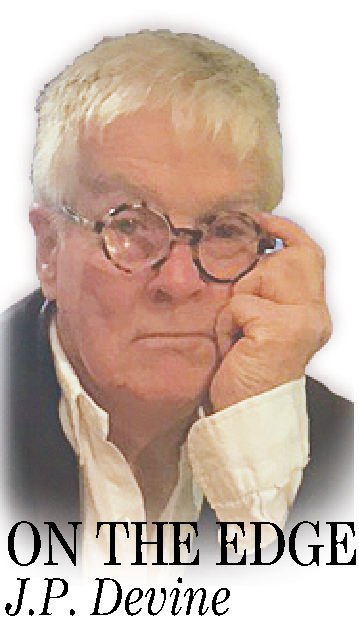“We do not remember days, we remember moments.”
— Cesare Pavese
December 1941. My father had died six months earlier. He ran Christmas at my house, and my mother, who was only 48 when he passed, had no heart for it. Now she was plagued with migraines and spent a lot of her time sitting by the kitchen window with a cup of her beloved coffee, while she stared out at my father’s empty bench under the grape arbor.
Sunday: My two oldest sisters, Rita and Eileen, were out, and I was left to read Orphan Annie comics to my baby sister, who smelled of Vicks VapoRub because she had a cold.
Stores were all closed and the streets empty of friends, and this Sunday afternoon seemed even drearier, with skies the color of the sidewalks while everyone had been waiting for snow to brighten the coming Christmas.
This cold Sunday, the twin brothers, Kerm and Kenny, fresh out of high school, were playing soccer with their friends. Jim, the second-oldest, was delivering special Christmas mail that day.
Matt Jr., the oldest of my brothers, the one we called “Bud” and the “postcard” brother, wasn’t there. He had joined the Navy at 17, and was assigned to my father’s old ship now berthed In Hawaii.
We had one whole wall in the kitchen plastered with his postcards and snapshots from away, standing with friends in summer whites, on a beach with surf boards, surrounded by girls and palm trees.
Jim, who took singing lessons and dreamed of one day becoming an opera singer, came home from his mail route, threw his coat on the kitchen chair and turned on the radio to listen to the opera. Then, something happened — a man’s voice broke into the music, and in a stern, anxious rasp, rattled off some words.
Jim got up from the couch and turned up the volume. Then he twisted the dial to different stations with other voices, and after a long pause, he said, “Jesus Christ,” and then shouted “Mom!”
I had no idea what had happened, and when Mama came into the room, he repeated what the men were saying.
I knew the words Pearl Harbor; that’s where the postcards and snapshots of sailors and the girls with a mountain in the background had come from.
I can still see my mother making the sign of the cross, putting her fingers to her mouth and dropping into my father’s empty green chair, where she never sat.
And then the phone rang again and again. It rang until supper, and then it stopped, and the house filled up with relatives, as it had done the night my father died. Something had happened, something strange and permanent.
There was no more music from that radio that day or night, just men’s voices scattered across the universe, falling like sleet on the roof, but there in the house we all sat in the living room, listening, while my baby sister slept with her head on my lap.
On Monday, school had been canceled, and people stayed home from work and waited for news. Father Keating came by and held my mother’s hand, and they whispered to one another.
I don’t know how long the wait was for the word to come. No one was allowed to use the phone. When a knock came at the door, everyone went to answer it.
I didn’t know until years later that it was Tuesday of that week before a telegram came with Bud’s name on it, and that morning, the Globe Democrat newspaper had printed a whole page of St. Louis servicemen’s pictures — pictures of the living, the missing and the dead.
Bud’s was there with the survivors, the paper was passed around, and a sigh of relief, more like a wind, came back into those rooms.
Once again I try to pull back the pictures of that day: the muffled voices, the smell of coffee in the kitchen, my sister’s Vicks VapoRub, my brother’s cigarette smoke on the porch.
That Sunday, something happened, and we were never the same again.
That night people went to Mass, and when they came out, it had finally started to snow. I remembered that years later in a bookstore in New York, when I read the last sentences in James Joyce’s “The Dead.”
“His soul swooned slowly as he heard the snow falling faintly through the universe and faintly falling, like the descent of their last end, upon all the living and the dead.”
J.P. Devine is a Waterville writer.
Send questions/comments to the editors.


